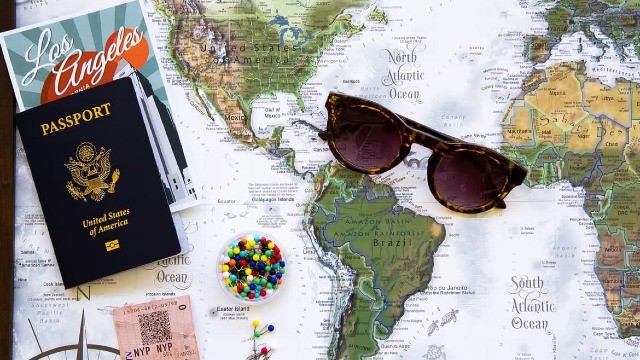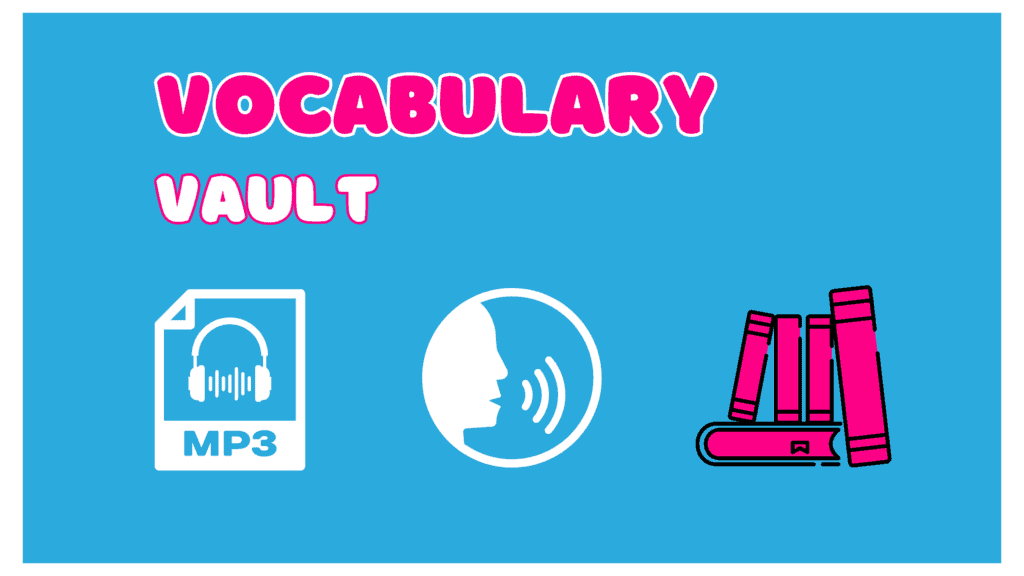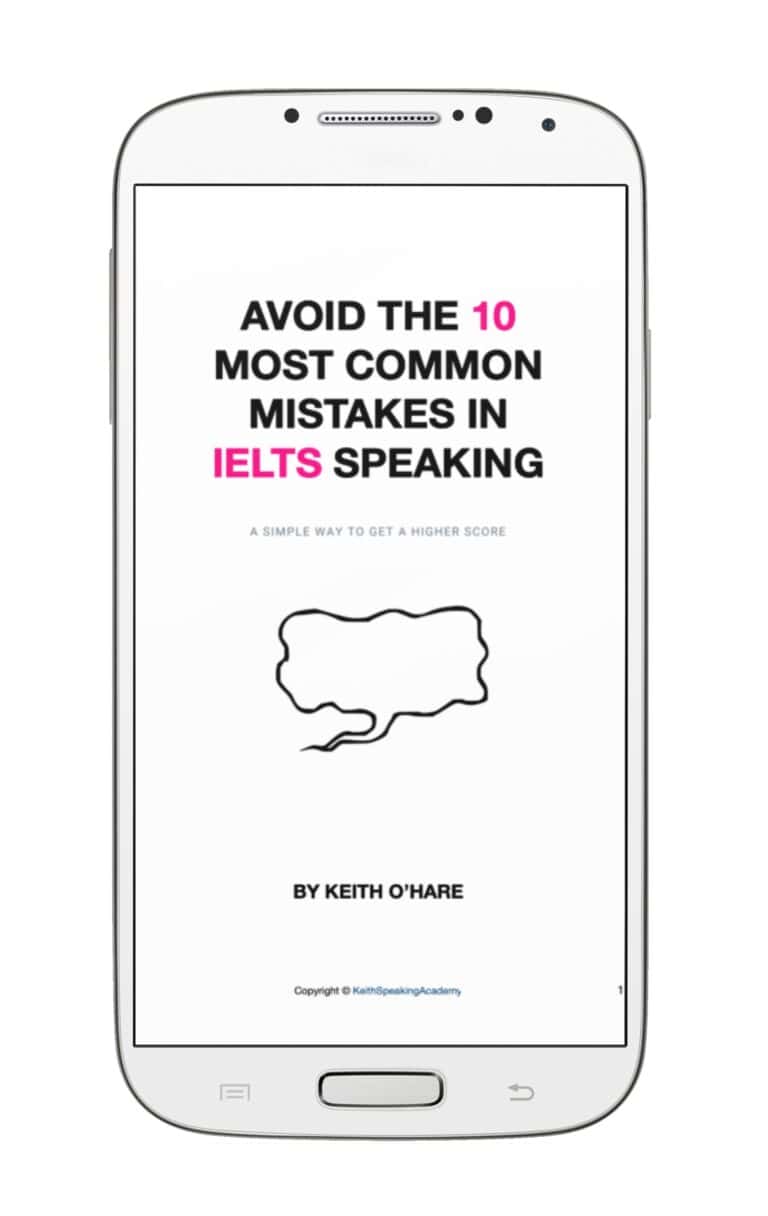IELTS Speaking Lesson about Travel
👇 Take this lesson with you! 👇
Talking about travel in IELTS Speaking is quite common and can pop up in Part 1 or possibly in Part 2 and Part 3
In this free IELTS Speaking lesson on the topic of friends, you will learn useful vocabulary and idioms to help you do well in the test.
Table of Contents
IELTS Speaking vocabulary: Travel
In this lesson, you will learn some vocabulary and useful expressions to talk about travel, tourism and holidays.
To travel by _____
- by bus
- by plane
- by boat
- by car / bike
- on foot
To travel (v.)
I usually travel by bus when I go to work.
Travel (n.) uncountable
I hate air travel
Travelling (n.) uncountable
Travelling is my biggest hobby
A Common Mistake
I went on a travel X 🙁
Correct English
I went on a journey 😁
I went on a trip 😁
A trip (n.) countable
- To go on a trip (on holiday)
- To go on a tour (visit in and around a place, e.g. a city, a museum)
- To go on a journey (the travelling bit only, eg by train)
- To go on an outing (a very short trip, e.g. half a day)
The people who travel or go on holiday can be called many different things. Here are some of the most common ways of referring to them.
- Travellers
- Holiday-makers
- Tourists
- Sightseers
We saw hordes (=lots of) of holiday-makers when we were in Rome
When learning new vocabulary, it is so important to learn the other words that are commonly used with that word. We call these ‘collocations’. Below we have some common collocations with the word ‘holiday’.
- To take a Holiday
- To book a Holiday
- To go on a Holiday
- To go on Holiday
Here are some more useful expressions that can be used to talk about travelling and tourism.
The following all mean ‘to visit tourist attractions
- To go sightseeing
- To see the sights
- To take in the sights
- To soak up the sights
When travelling, you may also want to spend some time away from the hustle and bustle of the busy sights. In this case, we can use these expressions.
- To get off the beaten track = to go to less visited places (where few tourists go)
- To get away from the crowds = to escape the tourists
When visiting a new city, I love to get off the beaten track and discover the real local culture.

IELTS Speaking vocabulary: Holiday accommodation
When traveling, there are many options for holiday accommodation. Here are the most common.
- A Hotel – often has private rooms, ensuite bathrooms, other facilities (swimming pool, if it’s 5 star)
- A Hostel – often has dormitories (shared rooms), it’s cheaper, more informal
- A Youth Hostel – hostel for young people (for members of the YHA in UK)
- A Resort (n.) – hotel + facilities, often food and drink are included
- A Camping Site / Campsite – a field to pitch a tent or take a caravan
- B & B – Similar to hostel, usually small and gives bed and breakfast
- Air BnB – Rented accommodation, people rent out their homes via the Airbnb website.
- A Self-catering Flat – private flat that you rent with a kitchen so you can cook.
IELTS Speaking part 3 tips
The secret to IELTS Speaking Part 3 is first to practice lots, so you have plenty of ideas to talk about and can talk flexibly on a number of topics.
Secondly, develop your answers.
You can do this by using some of the following combinations to structure your answer.
- Opinion
- Example
- Opinion
- Reason
- Opinion
- Reason
- Example
Let’s see some examples for the following question
What are the benefits and drawbacks of traveling?
I’d say one of the benefits is you can taste new food,
I mean when British people go to Japan
they get to taste a whole range of new local delicacies
that they may not find at home.
- Opinion = I’d say…
- Example = I mean…
What are the benefits and drawbacks of traveling?
I think one of the drawbacks is the cost,
it can be quite expensive
because if you are traveling by plane,
the price of plane tickets has rocketed in recent months.
So for example, if you want to travel from Europe to Asia,
a plane ticket can cost up to 1000 USD
- Opinion = I think…
- Reason = because…
- Example = So for example…
What are the impacts of tourism on a local economy?
To my mind, there is a direct impact on hotels and restaurants
since these are very popular with holiday-makers.
On the positive side,
tourism can increase sales in local restaurants
and is a valuable source of income
for the hospitality industry.
- Opinion = To my mind…
- Reason = since…
- Example = On the positive side…

Here are some more useful phrases and collocations to talk about this last question.
- There is a direct impact on shops and retail outlets
- On the positive side, tourism provides / creates / increases jobs
- It can boost / increase sales
- It may boost profits
- It will boosts local trade / commerce
- It’s a source of revenu
- It undoubtedly strengthens the local economy
However, there can be a downside in that it might…destroy local culture
However, there can be a downside which might be that it…destroys local culture
- destroy local culture
- lead to overcrowding
- bring noise pollution
- lead to excessive littering
Get more Tips for IELTS Speaking Part 3
IELTS Speaking idioms about travelling
Here are some great idiomatic expressions that you can use to talk about the topic of travel and tourism.
- To travel light = to travel with few items
I only take a small rucksack when I go on holiday, I love to travel light
- To get up at the crack of dawn = to get up very early
We have a tour of the city tomorrow, so we have to get up at the crack of dawn
- To make your way back = to return to the starting point
When the tour finishes, you can make your own way back to the hotel
- To have itchy feet = to love traveling
I have itchy feet, so I try to travel abroad twice a year.
Pronunciation Files For Vocabulary From My Best Live Lessons
Use Words EASILY in English Conversations!
More Free Lessons
If you liked this lesson, leave a comment below!
There are more lessons you can follow in the links below too.
RELATIONSHIPS in IELTS Speaking Improve your listening and speaking skills for the topic of relationships
HOLIDAYS in IELTS Speaking Discover the 10 things the British do on holiday and learn the useful vocabulary and idioms to talk about it.
NATION AND CULTURE in IELTS Speaking Learn the essential vocabulary for this topic, as well as how to talk about the connection between nation and identity.



Thanks a lot for your sharing!
My pleasure
sir actually i once bought your course but it was recorded lesson..is there any possibility to have face to face class.rather than live you tube
I am afraid I do not give one-on-one lessons now, just the self-study online courses and live lessons on Youtube.
Thank you so much keith you are really kind teacher, you got us a lot of experince. ❤️ ❤️ ❤️
Regards
Hussean
My pleasure Hussean!